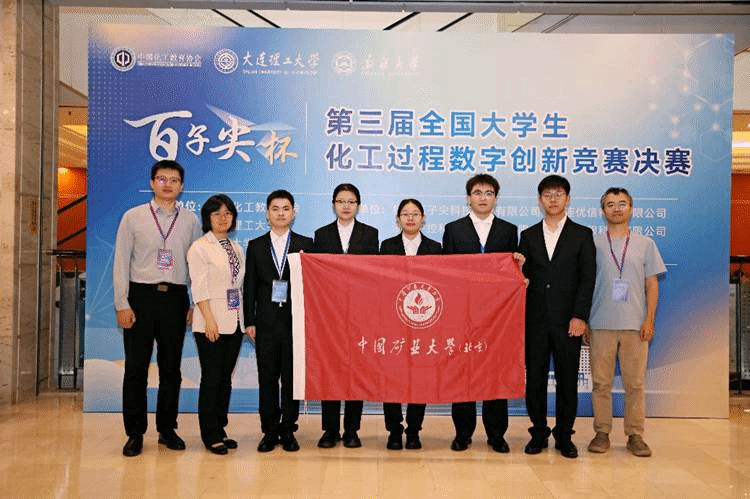Undergraduate Team and Advisors

Graduate Team and Advisors
From May 23 to 25, the national finals of the third "National College Student Chemical Process Digital Innovation Competition," hosted by the China Chemical Industry and Education Association, were held in Dalian. Two teams from the Chemical Engineering Department of the School of Chemical and Environmental Engineering at our university achieved outstanding results: the undergraduate team "Mining Elite," consisting of Xu Yirong, Xing Shuo, Zhu Xiaokang, Li Shuangyang, and Gao Rui (advisors: Zhang Zhijun, Cao Junya, and Liu Jinchang), won the national Grand Prize, while the graduate team "Outstanding Talents," composed of Tian Xing, Wang Fukang, Xu Jidong, Mu Miao, and Wang Shuting (advisors: Liu Jinchang, Cao Junya, and Zhang Zhijun), secured the national First Prize. The advisors were also awarded the Excellent Advisor Prize.
The report of the 20th National Congress of the Communist Party of China proposed "promoting the high-end, intelligent, and green development of manufacturing," accelerating the growth of the digital economy, fostering deeper integration between the digital economy and the real economy, and building internationally competitive digital industry clusters. Under this background, the "National College Student Chemical Process Digital Innovation Competition" emerged. This year's competition theme, "Optimization and Transformation Project of Absorption and Stabilization Systems," closely aligns with China's chemical industry's push for digital reform. On one hand, participants were required to achieve intelligent upgrades in production processes through industrial internet platform construction, smart factory transformation, and digital twin technology applications. On the other hand, they needed to leverage digital technologies like big data and artificial intelligence to optimize processes, reduce energy consumption and emissions, and promote green, low-carbon development.
The competition attracted 139 teams from 120 universities across the country, including 108 undergraduate teams and 31 graduate teams. Professor Cao Junya from our university served as a member of the competition's expert committee and acted as a specialized judge during both the preliminary and final rounds. Our undergraduate and graduate teams comprehensively utilized foundational data to digitally simulate production processes, providing digital solutions such as steady-state modeling, dynamic modeling, and graphical configuration. They also validated the rationality of startup/shutdown procedures, fault descriptions, and fault-handling plans through operational verification. The teams spent over eight months preparing for the competition, overcoming challenges and refining their work through meticulous efforts. By integrating interdisciplinary knowledge from chemical engineering, control systems, computer science, and artificial intelligence, their submissions earned unanimous recognition from the judging panel.
This outstanding achievement not only highlights the teaching accomplishments of our university's chemical engineering discipline in engineering practice and digital innovation but also advances the practical application of AI in higher education reform. Moreover, it demonstrates the program's capability to cultivate digitally innovative talents proficient in key cross-cutting technologies such as the Industrial Internet of Things, big data analytics, artificial intelligence, and digital twins.